|
| |
| |
| |
Ethel Portnoy 1869: A new tale of Sherlock Holmes
It was one of those evenings in mid-February that made one think the winter would never come to an end. All day long a freezing rain had beaten down upon the sodden cabmen waiting for their fares outside the clubs and mansions of Belgravia. Now the rain had stopped and a heavy mist had settled over London. Thin wisps of fog curled along the tall windows of buildings newly constructed in the neo-Gothic style. It was the perfect setting for the opening paragraph of a tale of Sherlock Holmes, which is not odd, for that is what this is.
I had been trying to return to the cosy lodgings I shared with that master of all detectives since five p.m.; it was now six and I had got no nearer than the end of the street in which I had started.
‘Can we get no farther, driver?’ I put my head out of the window to ask. ‘What is holding us up? At this rate I would do better to get out and walk!’
‘Wouldn't try that, sir, if I were you.’ The cabman pointed with his whip. ‘Crowd there on the pavement is just as thick as the traffic. Yer better off sittin' down inside.’
‘What is it then, driver? You have the better view.’
‘Tis a big reception, sir, just comin' out of the Wardour Hotel, sayin' goodbye and gettin' into carriages, a powerful crowd of people, too.’
Dashed then if I didn't know what it was - the wedding reception of Miss Prudence Fothergill, who had been married that very morning to a French military man. I had seen a notice of the wedding in the Times, and had also read that the reception was to be held afterward at the Wardour Hotel. Had I but kept the fact in mind and chosen some other itinerary! But it was too late; as the driver advised, I could only make the best of my present situation.
This was becoming more interesting as we slowly drew alongside the entrance to the Wardour Hotel. Here, as chance would have it, my patience was rewarded. In a little flurry of wedding-guests there suddenly appeared on the steps none other than Miss Prudence Fothergill herself - or, should I rather say, Madame la Générale Repplier de Bagatelle. Seldom have I beheld so exquisite a creature. She was scarcely nineteen summers old. Her pale, pretty face, fringed with fine blonde curls, was framed by a smart mauve bonnet that matched her traveling-costume. Her skirt, raised at one side with a bow, revealed the plump bulge of her calf tightly encased in a grey kid bottillon. Gloves of the same grey kid were on her hands, one of which clutched a bunch of violets, while the other was engaged in throwing kisses.
The gentleman at her side I recognized from his photograph in the London Illustrated News, as her father, Major Fothergill of the Molucca Lancers, the hero of many a dubious battle in the warmer parts of the Empire. His bushy grey sidewhiskers were quivering with emotion as he wished his daughter godspeed on her wedding-trip, - which, I recalled from
| |
| |
the article in the Times, was to be spent on the Continent.
And now, pushing his way through the guests to take the arm of his bride, here was - it could be no other - General Repplier de Bagatelle himself, the martial Frenchman who had come to pluck our English rose. He was a man of middle-age, heavy from too many French dinners, with a rather coarse face. He was, as I had heard, very rich. Miss Fothergill had made a good marriage, for the Major, as everyone knew, was a penniless career-officer.
As I was occupied with these reflections, my cab had slowly edged its way to freedom. The cabman lashed his horses to a good gallop to make up for the time we had lost, and soon I was bounding up the stairs to our rooms in Baker Street, an hour late for dinner.
‘The deuce, Watson, you are over an hour late!’ Holmes cried from his armchair near the fire.
‘This London traffic, Holmes, is getting worse every year. What it will be like a hundred years from now, in 1969, I should not like to imagine.’
‘Ring, Watson, and Mrs. Hudson will bring up your dinner on a tray.’
‘It will be stone cold,’ I mourned.
‘Not so! It is piping hot. The wedding of the fair Miss Fothergill was an event that made its way even to my own claustrophobic squalor. I read all about it in the morning paper even before you left the house. Knowing that your way home would take you past the Wardour Hotel, and that you yourself would not have read the Times as carefully, I at once deduced that you would be late for dinner. Thanks to my perspicacity, you are able to eat your mutton hot.’
‘I humbly crawl before you, Holmes, your powers of observation are indeed keener than mine. Yet while you have been sitting here reading newspapers, I at least have had a glimpse of the bride herself. She was a vision of loveliness.’
‘And General Repplier? What did you think of him?’
‘I merely saw him for a moment. I can't say I cared much for his looks.’
‘A rum fellow, Watson, a rum fellow. A drinker, a gambler, a chaser of skirts. In short, the finest flower of Frogland.’
His words made me brood as I sat over my pousse-café. Into what kind of hands had we confided our fair English maiden? As a doctor, I knew of too many cases not to think with apprehension of the first wedding night of this innocent child. I was about to impart these somber thoughts to my learned companion when I noticed that he had taken up his violin in his long, nicotine-stained fingers, and was preparing to draw the bow across the strings. Perhaps the same sad train of reflections had also suggested itself to him? To the sound of his melancholy scrapings I wended my way to bed.
The next morning a bright and frosty sun, shining in at the windows, dispelled any moody thoughts that might have clung on from the evening before. I came into our sitting-room to discover that Mrs. Hudson had already lit a cheerful fire and laid our breakfast on the table. Holmes was seated there in his scarlet dressing-gown, lifting the lid from a plate of steaming kedgeree.
‘To the trough, to the trough, Watson,’ he cried. ‘A fine day in February is indeed a
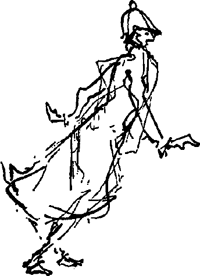
| |
| |
rarity. Have a good breakfast and then come with me to the Botanical Gardens, there's a good fellow! Herringbone has just received a new species of Venus' Fly-Trap from Brasil. Seven feet tall! No doubt someone will try to dispose of a body in it one of these days, eh Watson?’
‘Indeed it is a fine day for walking, Holmes,’ I said, looking out of the window at the bright sunlight that warmed Baker Street. ‘Here, what's this? A cab stopping at our door. I daresay it's someone to see you. My word! It looks like - it is - Major Fothergill!’
The Major - for it was he - hardly gave Mrs. Hudson time to announce him. He jostled right past her into the room, stood uncertainly in our midst for a moment, and then sank into a chair and buried his face in his hands.
‘Pray tell me, Major, what brings you here in such haste,’ said Holmes, not unkindly.
The man groaned. ‘Oh Mr. Holmes... I came straightaway to you as soon as I heard the news... my only daughter... whom I even yesterday gave in marriage... was this morning found dead... and in such a manner... Oh, I can say no more! My father's heart is broken. Avenge her, Mr. Holmes! Punish the one who has done this dreadful thing!’
‘Where was it, sir? Speak!’
‘On the night-packet to Calais. It is still moored at Dover. The harbormaster refused to permit it to leave... after they discovered... oh... oh...’
‘And my expenses?’ snapped Holmes.
‘General Repplier will doubtless vouch for those,’ I cried. ‘Let us be off, Holmes, at once!’
Leaving Major Fothergill to bury his quivering sidewhiskers in Mrs. Hudson's capacious bosom, Holmes and I threw on some clothing and tore down to Victoria Station by the first cab we found.
From where we stood in the Gare Maritime at Dover, we could see the night-packet for Calais still at her moorings. Her railings were hung with weary passengers.
‘Aha, Lestrade, you have got here before me,’ said Holmes to the familiar figure from Scotland Yard who met us at the head of the gangplank.
‘A nasty business, Holmes, a nasty business. I see you have Dr. Watson with you. His services will be welcome. Right this way, gentlemen.’
We followed Inspector Lestrade through a crowd of expostulating passengers to a first-class cabin on the port side of the ship. Two policemen posted at its door jumped to attention as Lestrade appeared.
He pulled a key from his pocket and ushered us in before him.
It was a scene of indescribable disorder. Bits of cast-off female clothing lay in crumpled heaps on the heavy Turkish carpet: here a mauve bonnet, there a grey kid glove, there a boot with gaping buttons, elsewhere more intimate garments trimmed in broderie anglaise and pale blue ribbon. A small table had been knocked over, and the decanter of port that had stood on it had oozed its ruby contents into a great stain in the rug. Athwart the bed lay the object of our concern, her fair forms partially concealed by a nightdress of flimsy batiste.
‘Stand back, gentlemen,’ I cried, ‘this is a sight that only a doctor may view.’ Suiting the deed to the word, I took Holmes by the arm and gently but firmly pressed him toward the door.
Within a few moments I was able to join him in the Captain's cabin.
‘Miss Fothergill - I mean, Madame Repplier, died of a hemorrhage caused by a puncture of the peritoneum,’ I informed him. ‘To put it more plainly, she was deflowered by some blunt instrument. A corncob? A baseball bat? Are there perchance any Americans aboard?’
‘Don't jump to conclusions, Watson,’ my companion snapped. ‘Although this does remind me of a certain well-known case.’
| |
| |
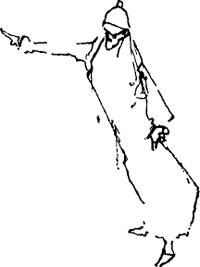
‘Now that you mention it, Holmes, it does ring a bell. Arbuthnot, Armstruther... what the deuce was the name?’
‘Well, never mind, never mind that now. Any witnesses? Who was the last to see Madame Repplier alive? Well, Lestrade?’
‘The General and his lady came on board at a quarter to eight, Mr. Holmes, direct from the London train. The ship was due to sail at ten. At nine General Repplier appeared in the saloon bar and drank a glass of whisky in the presence of several witnesses. At nine-fifteen, he returned to his cabin. At nine-seventeen, he gave the alarm. Therefore the crime must have occured between nine and nine-fifteen.’
‘Or between eight and nine,’ murmured Holmes.
‘Impossible, for then the General was with his bride.’
‘I see. Well, show him in, Lestrade, and let's get it over with.’
General Repplier appeared in the doorway at once, a glass of whisky in one hand and a cigar in the other.
‘Good morning, General. May I present my condolences on the unfortunate decease of your bride.’
‘My heart is broken, Monsieur 'Olmes,’ said the General, taking a puff at his cigar.
‘It seems you were the last person to see your wife alive. Kindly describe your movements last night.’
‘But of course. At nine p.m., I leave Prudence at her toilette, and I go down to the saloon bar to have a glass of whisky and a cigar while she prepare for bed. I come back and see this terrible thing. I run to the Captain at once.’
‘And I suppose there are plenty of witnesses to attest your presence in the saloon bar.’
‘But dozens, Monsieur, for every minute of the time. What are you insinuating? On board there must be some evil criminal men walking loose. I saw two Algerian people in burnoose 41 - ask them!’
‘Perhaps one of the sailors of the crew...’ I prompted.
‘That will do, Watson,’ my companion snapped. ‘Thank you, General.’
‘If you find the criminal, Monsieur Holmes, hold him for me. I run him through with my parade-sword.’
‘I shall keep that in mind. Good day, General.’
‘Well, Watson, what do you think?’ Holmes asked, as soon as the cabin door had closed behind the General's broad back.
‘Let us seek the two Algerians,’ I replied resolutely.
‘To the contrary, Watson, we shall dally here no longer. The one verification we might have carried out was the kind that no gentleman can ask of another. We shall have to use more roundabout methods. Come on, we have not a moment to lose.’
‘But where are we going?’
‘To Paris, as quickly as we can.’ He pulled his watch from his waistcoatpocket. ‘If we hurry, we can still catch the midday boat from Newhaven to Dieppe. That will give us several hours' advance on the General. From thence, the first train to Paris. Not a word of this to a soul, Watson.’
Paris, city of sin! At last I should be able to see for myself the scene of the many tales that had so deeply stirred my imagination. When we arrived, however, I found the streets full of commonplace people going about their
| |
| |
daily business. I expressed my disappointment to my distinguished companion.
‘The Paris you are thinking of exists mainly behind closed doors, Watson,’ he laughed.
‘But we shall, I hope, penetrate behind some of those doors tomorrow morning, if all goes well.’
I could get no further word of sense from him. At our hotel, he pulled out the opium pipe that never left his person, carefully filled it with a tiny ball from the stock he carried in the pocket of his Norfolk jacket, and settled into a dreamy stupor that was only interrupted by the appearance of coffee and some curious crescent-shaped crumpets the following morning.
After that, fresh as a rose, he threw on his greatcoat, and I followed him as he rushed pell-mell down the stairs into the street, where he hailed a passing cab.
‘Sank roo doe noo?’ asked the driver.
‘No!’ cried Holmes. ‘Twenty-five, Champs Elysées.’
By some miraculous stroke of luck, the cabman understood English, and we were soon clip-clopping down the famous thoroughfare, where the February sunshine was doing its best to force early buds from a double row of young trees. We drew to a halt at the threshold
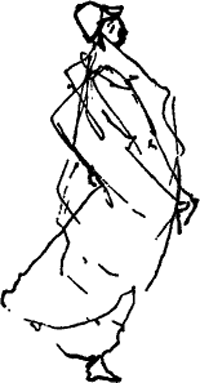
of a stately mansion - recently built, to judge from the pale color of the limestone.
A footman in livery opened the massive bronze door, and led us along a spacious vestibule, whose walls of mosaic were lined with benches of red marble. It would seem that even in this far-flung land, the illustrious name of Sherlock Holmes was known, for a few moments after Holmes had sent up his card, we were ushered into a vast drawingroom, whose five tall windows gave upon the avenue we had just quitted.
‘Where are we, Holmes?’ I asked my companion, ‘what is this place?’
‘Hush, Watson, not so loud. You are chez the Marquise de Païva, the most celebrated kept woman in Paris.’
To my English eye, this den of iniquity was heavily over-decorated, for every object seemed to bear a depiction of some sort. The ceiling, to which the weary eye roved in search of peace, showed Vulcan's blacksmiths forging arrows for Diana. Cupid was delivering the weapons to the divine huntress, who, sitting on a vapory cloud, accepted them with a gracious smile.
‘That, Watson, is a discreet allusion to the source of the wealth that built this palace of sin,’ Holmes whispered. ‘Madame de Païva's protector, Count Henckel, is the owner of huge zinc mines and iron foundries.’
A crystal dish on a marble table displayed a blooming mound of ripe peaches, fresh figs, and strawberries. Their presence in the month of February bore witness to a fine hothouse, and I was eyeing them greedily when a rich contralto voice behind me said, ‘Go ahead and take one, Dr. Watson - or is it Mr. Holmes? They are from my estate at Pontchartrain.’
I turned to find myself eye to eye with a tall woman of my own age, whose heavy white arms and bosom rose from a dress of scarlet velvet slashed with purple silk ribbons, that - to me at least - seemed most unsuitable for morning attire. With her large, brown, rather protruding eyes she gazed alternately at
| |
| |
Holmes and myself, while running the tip of her tongue over her crimson-tinted upper lip. Along her heavily-rouged cheeks tinkled a pair of diamond and ruby ear-bobs, equally unsuitable for display in bright sunlight.
‘Considering the upkeep of the estate, and the salaries of my gardeners, each piece of fruit costs me 5000 francs. Please, eat!’
Holmes preferred to ignore the expensive dainties. ‘My colleague here is Dr. Watson, Madame, and I am Sherlock Holmes. Please excuse our intrusion at such an unseemly hour of the day. We are here on urgent business, and need your help. I assume you know who I am, or else you would not have received me.’
‘I have heard of the illustrious detective Sherlock Holmes.’
‘Good. And have you also heard of General Repplier de Bagatelle?’
‘Everyone in Paris knows the General. I presume you are investigating the death of his unhappy bride, Mr. Holmes?’
‘Precisely.’
‘I have read about it in this morning's Figaro. A dreadful story. But it served Miss Fothergill right, of course. She tried to obtain by selling herself into slavery, what I have achieved as a free and independent woman.’
Holmes, as I expected, let pass this impudent speech. Moral lectures were not in order at such a delicate moment. He studied the carpet with a severe expression.
‘Well, and what can I do for you, Mr. Holmes? I must cut this conversation short, for I have an urgent appointment with my dressmaker.’
‘Madame, you may have access to information about General Repplier de Bagatelle that I as a gentleman cannot obtain.’ He cleared his throat. ‘Ah... ahem... you have read the story of the case.’
‘Why do you not approach his valet?’
‘The valet is doubtless trustworthy - or else only amenable to the sort of bribe that Major Fothergill could not afford to pay.’
‘I see. And what would he be able to pay - me?’
| |
| |
I had underestimated the grasping nature of the woman. Even with her tremendous wealth, and if only to avenge the murder of an innocent maiden, she could still speak in terms of a business transaction.
‘Major Fothergill is a poor man. As for General Repplier, he has not retained my services. In the interest of justice, I shall therefore pay you myself.’ He held out his hand, palm down. ‘This beryl ring, offered to me by the reigning family of Holland after I had served them in a matter of such delicacy that I could not even confide it to my good friend Watson, will be yours in return for your aid.’
The Marquise de Païva leaned forward to examine the magnificent jewel.
‘I am tempted, Mr. Holmes,’ she said at last. ‘I shall obtain the information. I am not personally acquainted with General Repplier. Therefore I shall begin by inviting him to dinner on Wednesday evening. Théophile Gautier and Arsène Houssaye will also be present. You see, I prefer the company of artists to that of Generals. You may leave the rest to me.’
Back in our hotel, Holmes threw himself on a divan and said, ‘Well, Watson, what did you think of the lady?’
‘That her fee is a high one. Has she not riches enough?’
‘A woman of that kind never has riches enough. Do you know her price? She has the nerve, still, at her age, to ask twelve hundred pounds per night! Her boudoir, my dear Watson, is full of filing cabinets. This is common knowledge in Paris. She has so many jewels, she has to file them: pearls under P, rubies under R, diamonds under D! Do you know her story, Watson?’
‘I am not as well acquainted with the legends of the demi-monde as you, Holmes,’ I replied, somewhat stiffly.
‘Come, come, Watson, you are in Paris now. Unbend a little.’
‘I confess the lady - the woman - intrigues me. You said that her protector is Count
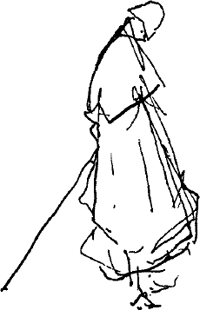
Henckel. Does he not object to her way of life?’
‘Count Henckel, after all these years, is still infatuated with her. He is moving heaven and earth to annul her marriage to the Portuguese nobleman whose name she still bears. Literally, earth and heaven, for every outstretched hand in the Vatican is waiting to be filled with the profits from his zinc mines.’
He reached for his violin-case, which he had had the foresight to snatch from the mantelpiece as we left Baker Street, and drawing the Stradivarius from its green satin cushion, tucked it gently under his chin.
‘The Marquise was born to a pair of penniless Polish Jews who lived in a godforsaken village in Russia. Her real name is Therese Lachmann. But she did not intend to blush unseen where Fate had put her down in the world. Her one virtue is her indomitable ambition. She used as her starting-capital the only form of wealth she possessed. She made her way to Moscow, and there became the wife of a French journeyman-tailor called Villourg.
One year later she deserted her husband and child, absconding with the meagre savings they had accumulated, to buy her ticket to this city. The first door she knocked at, here, was that of an up-and-coming young couturière, Camille. Taking a gamble, Camille dressed her from
| |
| |
head to toe, and sent her into society to do the rest. She made her fortune, and that of Camille. At last one of her conquests, the Marquis de Païva, offered her his name. Villourg had in the meantime conveniently died. What became of the child is not known. After Fate drove Count Henckel von Donnersmarck across her path - a cousin of the Kaiser, by the way, Watson - the Marquis de Païva had the good grace to retire to his Lusitanian estates. Her empire over Count Henckel has continued undiminished since the day they met. He has built her the most elegant mansion in Paris, settled forty thousand pounds a year on her, given her the estates of Pontchartrain, loaded her with jewels. All Paris views for invitations to her table. And that is what I am counting on to catch our fish, Watson.’
He had been tuning the strings of his violin throughout this burst of eloquence, and now he began to play a melancholy tune.
‘Despite all that,’ he muttered, ‘with her filing-cabinets full of diamonds and rubies, she can still bring up the animo to covet this beryl ring. Deep within the Marquise de Païva, future Countess Henckel von Donnnersmarck, still slumbers the ambitious girl who dreamed of escape from that dim Russian village. And now, leave me, Watson. I should like to be alone with my thoughts.’
On Wednesday morning, a liveried footman brought a note to our door. Holmes tore open the envelope and uttered a short, triumphant laugh. ‘The fish has snapped at the bait, Watson. General Repplier has accepted the invitation of the Marquise de Païva to dinner this evening. And now - we can but wait.’
For all his talk of calmly waiting, I could see that my colleague was highly nervous. As the evening wore on, he began pacing the rug in the sitting-room, where on a table lay untouched his dinner-tray of bisque de homard, ortolans, salade de truffes, and pêche Melba.
‘Come Holmes, eat your dinner,’ I urged.
‘You'll never see such grub at Mrs. Hudson's.’
‘I cannot, Watson, I cannot. My nerves are unstrung. Strange as it may seem, I am having qualms. We have asked that woman to put her head in the lion's mouth.’
‘Rather the reverse, Holmes, don't you think?’ I said drily.
‘Can she protect herself? Is she clever enough to find out what we must know, and yet stave off the worst? Have I sent her to her doom, Watson?’
‘Why Holmes, you actually seem worried about the fate of this expensive streetwalker! Has she bewitched you too?’
‘Pshaw, Watson. I see the matter in terms of simple humanity.’
Midnight went by, then one o'clock. My eyelids kept falling shut.
Suddenly there came a knock at the door. It was the footman again, with a note. As Holmes tore it open, I read the two words over his shoulder:
| |
Come quickly.
He threw it on the table and hustled into his greatcoat and deerstalker's cap. Ignoring the newfangled ‘ascenseur’, we pelted down the stairs after the footman and into a smart black brougham that took us again to 25, Champs Elysées.
Here we were shown up a staircase of black onyx that led directly into an immense bed-
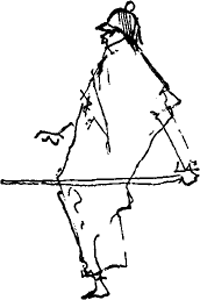
| |
| |
room, where a huge bed, inlaid with sandalwood and ivory, stood on a dais beneath a painted ceiling, whose centre medallion showed Amphitrite, seated on a dolphin. Suddenly, I became aware that I was standing in a powerful draft of cold air, whose source was an open doorway leading off the sumptuous bedchamber. The sound of streaming water that came from beyond this doorway identified the other room as a bathroom, and the draft indicated that its window must be wide open to the chill February night.
‘I am so sorry to have kept you waiting, Mr. Holmes, Dr. Watson,’ cried the Marquise when she finally appeared, in a pale green silk peignoir, as though wrapped in the waves of the ocean. Her bare neck and wrists were encircled in emeralds. ‘I fear I have remained too long in my cold bath. You see, I feel a constant need to cool my ardent blood with these chilly ablutions... Léonie!’ she called, ‘you may shut the window and go now.’
A pair of very small brown dogs ran in from the room she had just left, trembling and shivering as though about to die of exposure.
‘Is it not cruel to freeze such thin creatures?’ I protested.
‘It is the breed,’ the Marquise explained, ‘they always tremble so. Why Mr. Holmes, you look as though you can barely conceal your impatience. Please sit down, you are making me nervous, fidgeting about like that.’
‘I was worried for your well-being, Madam, and I find you gibbering about dogs.’
‘As you can see, I am perfectly all right. And the General, too, has gone peacefully home.’
Our faces must have fallen, for she hastened to add: ‘I have the information you asked me to obtain!’
I sat forward in astonishment. And she was safe! The woman's capacities must be tremendous.
‘In order to obtain it, and yet defend myself - for I had no desire to suffer the fate of the wretched Prudence Fothergill - I had to use my woman's intuition. Oh, you are smiling, but I assure you it has helped me in many a crisis. I was dressing for dinner, thinking of nothing in particular, when suddenly there shot into my mind our famous anecdote, concerning the late, distinguished statesman, Monsieur Coudé de Foresto. This very dignified and worthy gentleman, a man of irreproachable character, was accosted one evening by a respectueuse, who made him indecent advances... He drew himself up to his full height and cried, “But Madame. You are making a mistake! I am Coudé de Foresto!” Whereupon she replied, “Doesn't matter, lovey! We'll manage somehow!” Yes, I realized then that I too would have to manage somehow. It would be easy enough to induce the General to disrobe. But then what? What was to become of me?’
She advanced upon Holmes' chair with her finger roguishly to her lips. ‘At any rate, I can now answer the question in your mind, Mr. Holmes. The General is blessed with the anatomy of a full-grown zebra. Now I understand why he was not known to the ladies of the demi-monde, but no doubt very well to the mares of his regiment.’
‘I am intrigued, Madame,’ Holmes interjected, ‘as to the method you employed to avoid Miss Fothergill's fate.’
‘Holmes!’ I cried. ‘The case is solved. Why dwell upon these inconsequential details?’
‘Be still, Watson. Pray continue, Marquise.’
‘What year is this, Mr. Holmes?’
‘Your question is meant to be rhetorical. Very well. It is 1869.’
‘Does that cipher mean nothing to you, Mr. Holmes? Picture it in your mind's eye. The curving, receptive nine. The voluptuous six, snuggling in its hollow. Together they form the perfect figure of yang and yin, as embodied by the woodcarver who produced this magnificent bed.’
As he examined the emblem through his magnifying glass, a light began to dawn in the eyes of my illustrious companion. ‘But then, Madame, in view of the circumstances, you should
| |
| |
have died of a constriction of the windpipe!’
She laughed - a trifly coarsely, it seemed to me. ‘That too I foresaw, Mr. Holmes. I was able to persuade the General to deposit his homage where I thereafter deposed his handsome parting-gift...’ and she drew from the cleft of her spacious bosom a packet of shares in the Compagnie Générale de Suez.
‘Madam, you take my breath away.’
‘Never mind the compliments, Mr. Holmes. I have upheld my part of the bargain. Now you must go through with yours.’
Holmes extended his left hand to take a last look at the magnificent beryl, and then, with the right, began slowly to draw the ring from his finger.
‘I suppose you will file it under B,’ he muttered between clenched teeth.
‘Stop, Mr. Holmes. I will not take your ring.’
‘Aha! Then you have something else in mind.’
‘You are quite correct in assuming my motives were not those of pure charity.’
‘Out with it, then.’
‘Forgive my asking so personal a question in front of your friend. Mr. Holmes, are you a Virgin?’
‘Holmes, I think I had better be going,’ I interposed.
‘Why? Watson. Stay... I am a Sagittarius, Madam.’
‘Can you be so unworldly as not to know what I mean?’ said that Circe, entwining her massive forms around the greatcoat of my friend, throwing to the ground the deerstalker's cap which in his excitement he had forgotten to remove, and winding her fingers through his thinning hair.
‘Unhand me, Madam! Rather take the ring!’
The trembling brown dogs, which until now had lain quietly on a cushion near their mistress' chair, ran forward and began to make lascivious movements against the trousers of my worthy colleague, while gripping his shanks with their thin forepaws.
‘Call off your dogs, Madam! They are debauching my bootlaces!’
‘Mr. Holmes! Let me show you how I led the General to his doom!’
‘Nonsense,’ snapped Holmes. ‘I do not wish to be involved in such games. They draw the vital fluid from the brain.’
‘Mr. Holmes...’
‘Help, Watson, help!’
‘See you later, Holmes,’ I blushed, and like a coward, withdrew...
How Holmes finally extricated himself from the clutches of the Marquise de Païva after I had awaited him two full days at our hotel, how General Repplier de Bagatelle was tried for manslaughter and sent to Devil's Island, how the Countess Henckel von Donnersmarck was ultimately expelled from Paris - all this I shall not relate here. Suffice it to say that sometimes, of a summer evening after dinner, as my illustrious colleague sits peeling a banana, he murmurs, ‘Watson, in my life I have known and admired two splendid women. Irene Adler was one. The Marquise de Païva was the other.’ And he pensively nibbles at the vertical fruit, with the dreamiest of looks in his hawk-like eye.
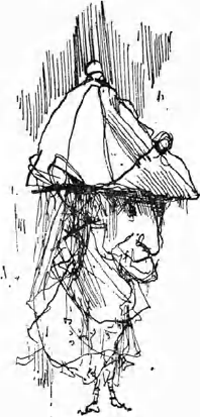
|
|